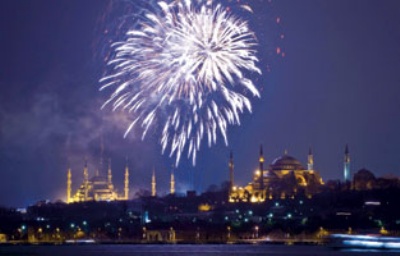
On an occasion in which more than 4,000 guests, including President Abdullah Gül and Prime Minister Recep Tayyip Erdoğan, were estimated to have participated, it was Erdoğan's words that left a mark on the evening and which were frequently interrupted by the audience's applause. The inauguration started with a speech by Şekib Avdagiç, the chairman of the executive board of the ECOC Agency, who explained the process of how İstanbul was chosen as a capital of culture, how the agency was established and how the 518 projects undertaken had been chosen.
Saying that it was a privilege to have the opportunity to serve İstanbul, Avdagiç noted that İstanbul has a common ground, a common culture, a common past and a common future with the world. Avdagiç urged people to re-discover the city, saying, “Now is the time for İstanbul.”
Kadir Topbaş, mayor of the İstanbul Metropolitan Municipality, emphasized that 2010 is a living process, and he encouraged people to experience the beauty and wealth of İstanbul's culture. Luc Van den Brande, the president of the European Union's Committee of the Regions, expressed how he was impressed by İstanbul. Describing İstanbul as “a cosmos, a cosmopolitan community,” he said, “When I view history, it is part of our common heritage, but İstanbul is part of our common future.”
State Minister Hayati Yazıcı highlighted the multicultural and multi-religious aspects of İstanbul. “İstanbul has a lot of things to tell us,” said Yazıcı. “With its mosques, churches, palaces, libraries, 100-year-old plane trees, fountains, lively bazaars and streets, İstanbul is calling to us.” Yazıcı also pointed out the timing of İstanbul as a choice for capital of culture, noting that European societies are becoming increasingly introverted. Yazıcı further said İstanbul would contribute to the making of a European culture that embraces different cultures without prejudice.
The prime minister, the former mayor of the İstanbul Metropolitan Municipality, recalled his days at the municipality with a speech in which he referred to the city's rich cultural heritage. Reading poems by Yahya Kemal, Sezai Karakoç, Necip Fazıl Kısakürek, Nazım Hikmet and Nedim, Erdoğan said that İstanbul was consigned to us by history and civilization.
Erdoğan highlighted the place of İstanbul in world history and its multicultural structure. “İstanbul is a little bit of Sarajevo, a little bit of Jerusalem. It's Paris, Vienna, Madrid. It is Baghdad, it is Damascus, it is Amman. But İstanbul is mostly İstanbul.” Pointing out the tolerance and coexistence in the city that has existed for centuries, Erdoğan said mosques, churches and synagogues sit on the same street in peace and tolerance.
An eagerly awaited moment of the inauguration was the “Spell of İstanbul” (İstanbul Büyüsü), a show that held many surprises for the audience. Produced by artistic director Yekta Kara, the show integrated traditional and folkloric songs about İstanbul played by a symphony orchestra. Singing about İstanbul were prominent artists such as Mazhar-Fuat-Özkan, Sertab Erener, Fatih Erkoç, Zuhal Olcay, Kubat, Aynur Doğan (with a Kurdish song), Bekir Ünlüataer and Dilek Türkan, the vocalist from İncesaz. Well-known actors Cüneyt Türel and Yetkin Dikinciler contributed with poems about İstanbul.
The multicultural aspect of İstanbul was again reflected in dance: whirling dervishes, folk dances and gypsies were among those who were recalled as elements of İstanbul's cultural fabric.
The Three Divine Religions Group, comprising the İstanbul Historical Turkish Music Community, Yako Taragano and friends, and Kevork Tavityan, all sang religious songs in their own languages.
The official inauguration ended with a spectacular fireworks display that was greeted with enthusiasm and delight by İstanbulites despite the cold and rainy weather.
















